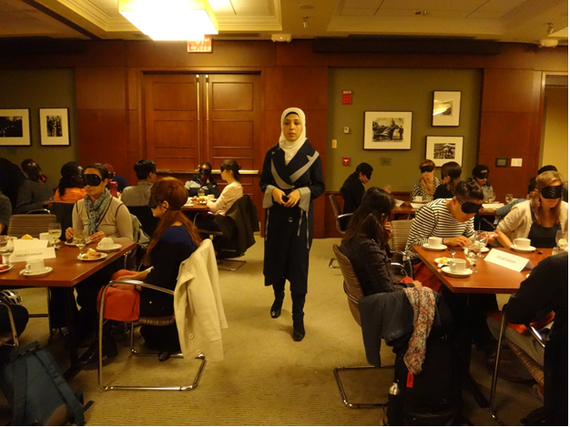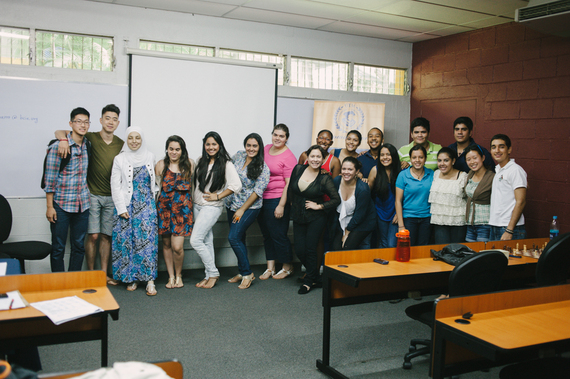As a consumer of American mass media, I've got to tell you: portrayals of Muslims leave much to be desired.
She is commonly the victim.
He, of course, is the savage.
And, lost in these maddening depictions is the savior. The hero/ine. But, wait, I mean, really -- do they even exist (outside of some groundbreaking comic books)?
In 2001, the Harvard International Law Journal published an article by Professor Makau Mutua titled, Savages, Victims and Saviors: The Metaphor of Human Rights. The three dimensional metaphor informs our perception and understanding of human rights, Mutua writes.
The victim is powerless, helpless and innocent.
The savage is a barbarian, cruel and authoritarian.
The savior is a good person who helps, protects and rescues.
In his scholarship, Professor Mutua highlights the metaphor's negative racial connotations. Whereas victims and savages are generally non-whites and non-Western, saviors are predictably white, he explains.
If we reflect upon the Savage-Victim-Savior metaphor in the post 9/11 context, negative religious connotations also emerge as described above.
Still are such depictions truly representative or comprehensive? Is the Muslim community totally bereft of saviors -- good people who help, protect and rescue?
Nope. But, you probably won't see them on your phone, computer or TV screens as much as the grossly overrepresented villains.
Except for, perhaps, here...

Sara Minkara, an American Muslim heroine, hosts an event at Harvard University to enhance awareness about people living with disabilities.
Sara Minkara, 25, is a Visiting Fellow at Harvard's Carr Center for Human Rights Policy. She serves as president and founder of Empowerment Through Integration (ETI), an international non-profit that empowers blind youth with necessary life skills and support to facilitate their inclusion and success.
Minkara lost her eyesight at age 7. With her family's support, she excelled in school. She attended Wellesley College and then earned a graduate degree in public policy from Harvard University. She also traveled abroad which helped her gain insight into the challenges and struggles experienced by people living with disabilities in other countries.
Minkara explains,
My experience as a blind individual in different cultures allowed me to see the inequality faced by the disabled in the developing world. Where I was afforded the best care through government and private institutions, this support system was missing in many developing nations. For example, the Massachusetts School System provided me with various accommodations and The Americans with Disabilities Act guaranteed me equal access to public accommodations and employment. These programs do not exist in so many other nations. I was aghast to discover this disparity when traveling abroad.
Her experiences translated into a passion for disability empowerment and inclusion. At ETI, Minkara works to support disadvantaged blind youth to help them realize their potential.
Interestingly, at a time when public discourse views Islam and Muslims almost exclusively through a security lens, the visiting Harvard human rights fellow draws heavily upon her spirituality and Muslim upbringing as a source of inspiration, strength and guidance.
Minkara reflects,
I am blind. I am a woman. And, I am Muslim. In many communities, a person who identifies with one, let alone all three, of these experiences a certain kind of marginalization of the "other". In addition, there is marginalization of the "invisible other" that affects the disabled population and disabled women, most of all. However, because I was raised in a family and community where being blind was not viewed negatively, boys were not treated different than girls, and the principles of Islam and its application to my life and my own decisions were understood, all of those factors have enabled me to be very confident in who I am and what I have to offer.
And, Minkara's heroic efforts have been recognized. In 2009, Minkara received the Clinton Global Initiative Outstanding Commitment Award, among other accolades.
She further observes,
We, as a society, need to empower people with the agency to find solutions--pitying them is neither necessary nor helpful. We should embrace disability rather than being complacent. God will not burden us with something that we cannot handle; in fact, we are created by Him, perfectly imperfect. However, over time, society has determined what is good and what is bad and who is able and who is not able. Society has created these imperfections and barriers.
Significantly, Qur'anic scripture helps inform Minkara's worldview and human rights work. She elaborates,
I truly believe that every creation of God is a miracle. Diversity is a miracle from God. The Quran states, "Had God willed, he would have made you all as one nation." (Quran 16:93). He could have created us all the same but he did not--there is a purpose for those differences. We should reflect on that fact in order to appreciate why He created us all different. However, at the same time, He does not focus on those differences in the ways in which He treats us. In His eyes, we are all equal--He does not look down on us. So why do we as a people look down upon and make differences in God's Creations? How is it that we can see the miracle of and beauty in differences and diversity in nature but we find it difficult to appreciate that same type of diversity and miracle in people? I want every single blind kid in the world to see the positive and miracle in their state and to know that they are God's creations and have much to offer the world.
Minkara's experiences have strengthened her resolve to help others with unwavering perseverance, patience and courage. Ask anyone whose life she has touched, Sara Minkara is a hero.

